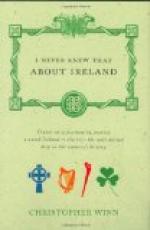The tenant proceeded against (says Lord Clanricarde, owed four and a-half years’ rent, at L47 8s. per annum) much below the taxation valuation of L67 19s., for a mill, with the sole use of the water-power, a valuable privilege, and 440 statute acres, a considerable part of them arable land. He had ten sub-tenants, was reported to make L500 per annum from mill and farm, and though he had removed part of his stock, there were still cattle on the land on the day of eviction enough to cover two years’ arrears. If he had paid even those two years on account he would have received an abatement, and saved his farm. The judge in Dublin who gave the decree against him, gave also costs against him to mark his sense of the tenant’s bad conduct.”
And to think that good, honest, noble-hearted, and sincere Englishmen, who in their own persons are law-abiding, just, honourable, and faithful, should uphold a state of things which strikes at the root of all law, all commercial honesty—blinded as they are by the glamour of a generous, unreal, and unworkable sentiment! If only they would go over to Ireland to judge for themselves on the basis of facts, not fancies—and to be informed by truths not lies!
I know that we cannot all see alike, and that every shield has its two sides. In this matter, on the one side stand Earl Spencer, now converted to Home Rule, since his Viceroyalty; on the other is the example of Mr. Forster, who went to Ireland an ardent Home Ruler and came back as strong a Unionist. The Quaker became a fighting man, and the idealist a practical man, believing in facts as he had seen them and no longer in sentiments he could not realise—in measures grounded on the necessities of good government, and not like so many epiphytes with their roots in the air. Let Lord Spencer bring to this test his late utterances. He goes in now for Home Rule, and the right of Ireland to appoint her own police and judges. He is out of the wood and can hallo; but where would he have been if the Irish had appointed their police when he was at the Castle?—with Lord Frederick and Mr. Burke! And if the judges were appointed by the Irish, we should have, in all probability, Mr. Tim Harrington, barrister-at-law, on the bench; and a few years ago Mr. Tim Harrington crumpled up the Queen’s writ and flung it out of the Court House window. And what power over the fortunes of others can be given to men who boycott a railway for political spite?[G]




